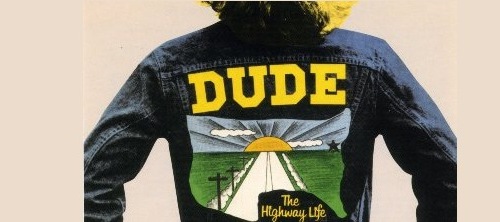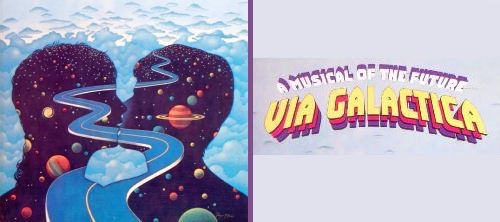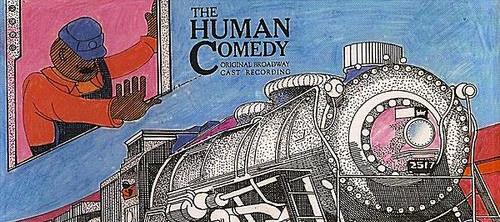Pas de biographie disponible.
Compositeur Musique additionelle Librettiste Parolier Metteur en scène Chorégraphe Producteur création Producteur version

Musical
Musique: Galt MacDermot • Paroles: Gerome Ragni • Livret: Gerome Ragni • Production originale: 1 version mentionnée
Dispo: Résumé Génèse Liste chansons
Genèse: As soon as the musical Hair opened, Ragni began to work on Dude. MacDermot was busy with Two Gentlemen of Verona but finally began to compose the music. In March 1972, their studio cast album, Salome Bey Sings Songs from Dude, was recorded and released on Kilmarnock Records. The music was more influenced by country music than their previous musical, Hair. The rehearsal period was plagued with problems: Kevin Geer, the actor who had been cast in the leading role, Dude, was unable to sing the role acceptably and had to be replaced; the script (such as it was) was far from finished; Ragni's requests of the producers were bizarre (for example, 100 butterflies to be released at the beginning of each performance); and the cast threatened to walk out. Production In The Broadway Theatre, the musicians were divided, with brass and woodwinds against the wall of one side of the playing area and strings at the other. To accommodate the multimedia presentation, the theatre was gutted and reconverted, at a cost of $800,000, into a circus-like arena in the center (a theatre in the round) filled with fake dirt (real dirt had caused dust; wetting it had caused mud), ramps, runways, catwalks, columns, trapezes, trapdoors, bleachers, and various mechanical and electronic gear. Performers moved freely between the round playing area, representing "Earth", and the audience, seated in flanking "valleys and foothills," with "mountains and mountain tops" beyond and "tree tops and trees" (mezzanine) above. "Heaven and hell" were also represented. The overall effect was of a circus being performed in a primeval forest. The previews were disastrous, as the audience could not hear with the orchestra scattered around the edges of the theatre. Despite attempts at amplification, the acoustics were still bad in the hollowed out theatre. The director and choreographer resigned, to be replaced by Tom O'Horgan, who had directed Hair and Jesus Christ Superstar. Previews were shut down, and the show went back into rehearsal. Some cast changes were made, and flamboyant visual effects were added. The director and cast confronted Ragni and forced him to rewrite scenes, including most of the second act. Actors wrote some of their own dialogue. The script finally settled down, mostly, by the second to last preview. After sixteen previews, the Broadway production, directed by Tom O'Horgan, opened on October 9, 1972 at The Broadway Theatre. Universally crucified by the critics (and audiences), who found it incomprehensible, it ran for only 16 performances. The cast included Nell Carter, Rae Allen, Salome Bey, and Ralph Carter, who won the Drama Desk Award for Most Promising Performer. Ralph Carter, an 11-year old African-American, replaced Kevin Geer, a white 23 year old, who was originally slated to play "Dude", due to Carter's age, Nat Morris was cast as "Big Dude" in order to still use the more mature songs. Despite leaving the show, Geer's image, with his back facing the camera was used for the show's poster. Only five weeks after Dude closed, MacDermot experienced another major failure with the flop musical Via Galactica.
Résumé: Reba and Harold, actors who believe they have been cast in Richard III, instead find themselves portraying Adam and Eve in a Garden of Eden-like setting, where they are tempted by Zero (the devil) and give birth to son Dude. The forces of Good (#33, Bread, Susie Moon, Mother Earth, and the Shubert Angels) and Evil (Zero, Nero, Esso, Extra, and Sissy) try to gain control of Dude's soul. Dude grows up and succumbs to the temptations of bizarre sexual practices and illicit drugs, leaving his parents guilt-ridden, until Guide #33 (God) assures them that life is merely show business and everything has a happy ending.
Création: 9/10/1972 - Broadway Theatre (Broadway) - 16 représ.

Musical
Musique: Galt MacDermot • Paroles: Christopher Gore • Livret: Christopher Gore • Judith Ross • Production originale: 1 version mentionnée
Dispo: Génèse Liste chansons
Genèse: Originally entitled Up!, it offers a futuristic story of social outcasts living on an asteroid in the year 2972. Among them is Gabriel Finn, a space sanitation man who collects trash in a clamshell-shaped garbage ship called the Helen of Troy. The storyline was so incomprehensible that at the last moment producers decided to insert a plot synopsis in the Playbill, but audiences were still baffled by what they were witnessing unfold on stage. Pyrotechnic displays and other special effects did little to enhance the project. After fifteen previews, the Broadway production, directed by Peter Hall, produced by George W. George and choreographed by George Faison, opened on November 28, 1972, the first production at the brand new Uris Theatre where, unable to withstand a universal assault by the critics, it ran for only seven performances. The cast included Raul Julia, Irene Cara, Keene Curtis, Chuck Cissel, Ralph Carter, Melanie Chartoff, and Virginia Vestoff. Via Galactica, one of the first Broadway shows to lose more than $1 million, was MacDermot's second flop of the season. His Dude had closed after 16 performances a mere five weeks earlier. MacDermot's score has continued to be of interest - with the composer presenting much of the score the Cooper Union on 4 April 2002
Résumé:
Création: 28/11/1972 - Gershwin Theatre (Broadway) - 15 représ.

Musical
Musique: Galt MacDermot • Paroles: William Dumaresq • Livret: William Dumaresq • Production originale: 3 versions mentionnées
Dispo: Résumé Synopsis Génèse Liste chansons
Genèse: The off-Broadway production, directed by Wilford Leach, opened on December 28, 1983 at Joseph Papp's Public Theater, where it ran for 79 performances. The cast included Stephen Geoffreys as Homer, Bonnie Koloc as Kate, Don Kehr as Marcus, Mary Elizabeth Mastrantonio as Bess, Josh Blake as Ulysses, Rex Smith as Spangler, Gordon Connell as Grogan, Leata Galloway as Diana, Joseph Kolinski as Tobey, Caroline Peyton as Mary, and Laurie Franks as Miss Hicks. Like Hair and A Chorus Line before it, The Human Comedy garnered reviews favorable enough to prompt Papp to transfer it a larger, uptown Broadway house. After twenty previews, with its downtown director and cast intact, it opened on April 5, 1984 at the Royale Theatre, where it ran for only 13 performances. Frank Rich's critique of the original production had been positive, but New York Times policy prohibited re-reviewing shows unless they were changed substantially, so his earlier comments were overshadowed by those damaging ones made more recently by Clive Barnes, among others. The general consensus was that The Human Comedy, with its intimate story staged in a semi-oratorio style with no scenery save for rear projections used to define each scene's locale, was not suited for a large venue with a conventional proscenium stage. Following Dude and Via Galactica, it was MacDermot's third critical and commercial failure, and proved to be his last attempt at a Broadway musical. An original cast album was recorded but never released until 1997, when an 86-track, 2-CD set was issued by Original Cast Records In autumn of 1997, the show enjoyed a partially staged reading at the York Theatre in New York City as part of the York's Musicals In Mufti series.
Résumé: The show is set in the World War 2 Californian town of Ithaca (a classical reference to the place Ulysess longed to return from his Odyssey). 14 year old Homer Macauley, a telegram messenger, faces the day-to-day sorrows and joys of the town. His mother Kate struggles to support her children following the death of her husband; his older brother Marcus is in the army; his teenage sister Bess daydreams about romance; and his younger brother Ulysses divides his attention between the passing trains and an unrequited desire to know why his father had to die. Other characters include Spangler and Grogan, who run the telegraph office, Spangler's girlfriend Diana, Marcus's orphaned army buddy Toby and Marcus's sweetheart Mary. There are glimpses of deep pain in the story, especially when Homer brings his mother the telegram announcing the death of his older brother, and the scene in which the bereaved citizens are presented with neatly folded American flags in memory of their dead soldier sons.
Création: 28/12/1983 - Public Theatre - Anspacher (Broadway (Off)) - représ.
